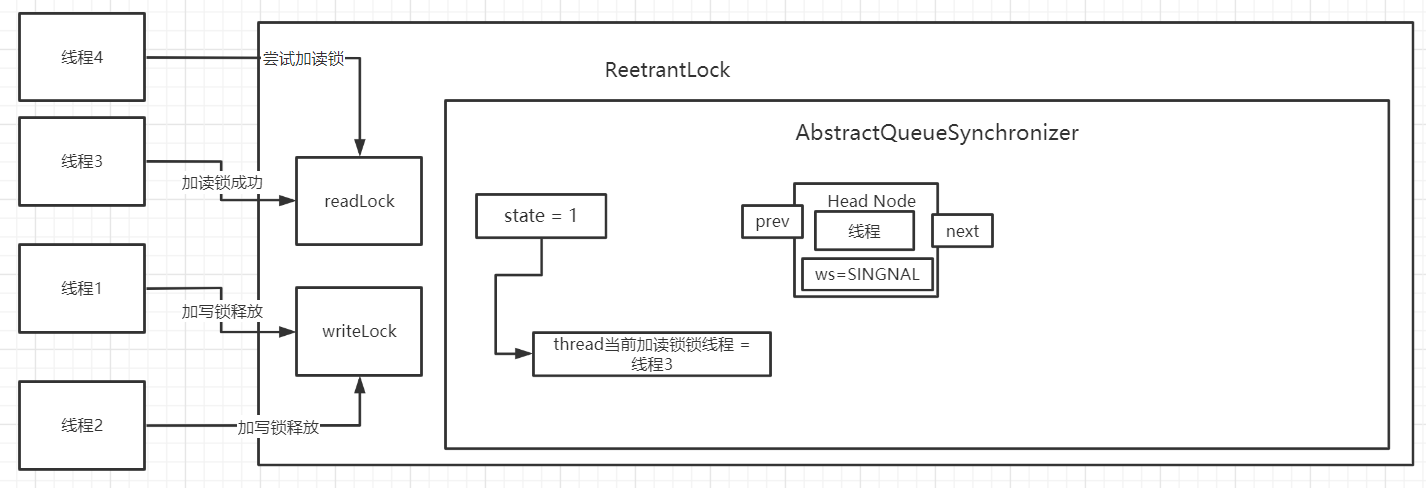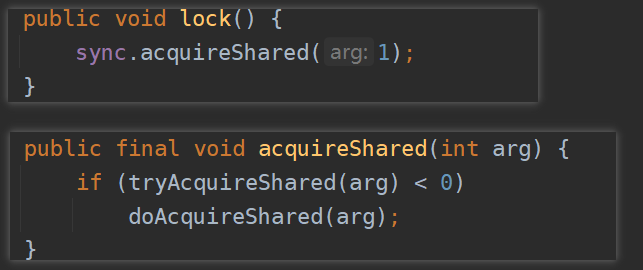目前是下图的样子,线程1,2写锁都已经释放了,线程3加上读锁后还未释放,此时线程4来尝试加锁
仍然走的下面的代码
tryAcquireShared,尝试加锁。
protected final int tryAcquireShared(int unused) {/** Walkthrough:* 1. If write lock held by another thread, fail.* 2. Otherwise, this thread is eligible for* lock wrt state, so ask if it should block* because of queue policy. If not, try* to grant by CASing state and updating count.* Note that step does not check for reentrant* acquires, which is postponed to full version* to avoid having to check hold count in* the more typical non-reentrant case.* 3. If step 2 fails either because thread* apparently not eligible or CAS fails or count* saturated, chain to version with full retry loop.*/Thread current = Thread.currentThread();int c = getState();if (exclusiveCount(c) != 0 &&getExclusiveOwnerThread() != current)return -1;int r = sharedCount(c);if (!readerShouldBlock() &&r < MAX_COUNT &&compareAndSetState(c, c + SHARED_UNIT)) {//这块代码不用太关心,就主要就是维护了一些加锁次数if (r == 0) {firstReader = current;firstReaderHoldCount = 1;} else if (firstReader == current) {firstReaderHoldCount++;} else {HoldCounter rh = cachedHoldCounter;if (rh == null || rh.tid != getThreadId(current))cachedHoldCounter = rh = readHolds.get();else if (rh.count == 0)readHolds.set(rh);rh.count++;}return 1;}return fullTryAcquireShared(current);}
- exclusiveCount(c) != 0 && getExclusiveOwnerThread() != current;条件不成立,进入下面的代码块
- int r = sharedCount(c);获取高16位的值,读锁加锁次数
- !readerShouldBlock() && r < MAX_COUNT && compareAndSetState(c, c + SHARED_UNIT)
- readerShouldBlock()
- 公平实现:就是判断一下有没有线程在等待着
- 非公平实现:返回true,意味着当前线程不是第一个排队的线程,同时队列中第一个等待的线程是独占模式的。返回false意味着前面没有写锁。
- r < MAX_COUNT,判断读锁加锁此时有没有超过可加锁的最大值
- compareAndSetState(c, c + SHARED_UNIT);用cas修改一下state值,表示加锁成功
- readerShouldBlock()
- fullTryAcquireShared(current);,线程3cas时,线程4也来抢这个读锁,此时线程4是cas不成功的,就要执行当前这个方法。这个方法就是用于同时加读锁,有一个线程失败的情况下,去让加读锁失败的线程去for循环去加锁。
final int fullTryAcquireShared(Thread current) {/** This code is in part redundant with that in* tryAcquireShared but is simpler overall by not* complicating tryAcquireShared with interactions between* retries and lazily reading hold counts.*/HoldCounter rh = null;for (;;) {int c = getState();if (exclusiveCount(c) != 0) {if (getExclusiveOwnerThread() != current)return -1;// else we hold the exclusive lock; blocking here// would cause deadlock.} else if (readerShouldBlock()) {// Make sure we're not acquiring read lock reentrantlyif (firstReader == current) {// assert firstReaderHoldCount > 0;} else {if (rh == null) {rh = cachedHoldCounter;if (rh == null || rh.tid != getThreadId(current)) {rh = readHolds.get();if (rh.count == 0)readHolds.remove();}}if (rh.count == 0)return -1;}}if (sharedCount(c) == MAX_COUNT)throw new Error("Maximum lock count exceeded");if (compareAndSetState(c, c + SHARED_UNIT)) {if (sharedCount(c) == 0) {firstReader = current;firstReaderHoldCount = 1;} else if (firstReader == current) {firstReaderHoldCount++;} else {if (rh == null)rh = cachedHoldCounter;if (rh == null || rh.tid != getThreadId(current))rh = readHolds.get();else if (rh.count == 0)readHolds.set(rh);rh.count++;cachedHoldCounter = rh; // cache for release}return 1;}}}

